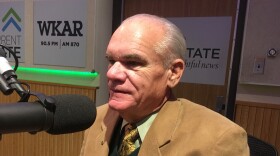According to the Michigan State Police, there were 516 individual acts of violent crime in Ingham County in 2015. That’s the most recent year for which there’s available data. A dozen of those incidents were homicides.
When police are called to investigate a tragedy, they often rely on volunteers to help a victim’s family members emotionally process what’s taken place. In Ingham County, that duty rests with an all-volunteer force: the Victim Advocate Unit.
Pattie Thayer remembers the first time she crossed the yellow tape barrier most of us only see on TV and the movies. It was 15 years ago. She was a victim advocate trainee working with the Lansing Police Department. Her first case was a homicide.
“I didn’t know what I was doing,” Thayer confesses. “I have a gift for dealing with people, but I didn’t know how to deal with something like that. I’d never seen anything like that.”
Thayer doesn’t talk about the details. But she found herself going back again and again to comfort total strangers facing their darkest moments. Her desire to help overpowered her instinct to hide.
Today, as coordinator of the Ingham County Victim Advocate Unit, Pattie Thayer seeks out volunteers who share that same drive.
The unit was formed more than 20 years ago by then-sheriff Gene Wriggelsworth. Each advocate is an unpaid volunteer, on call 24/7. The current team has 13 members. All of them are women.
Thayer has no formal training as a counselor or therapist. But she’s learned the key: knowing who to talk to...and to listen to them.
“A lot of times, there’s a lot of hysterics going on,” she says. “Sometimes there’s 10, 20 people at a scene at a time. Usually we show up in groups of two, and there’s only so much that we can do. So, we try to get to the next of kin or the immediate family members that we can help the most.”
Sometimes, those closest to the tragedy don’t want the help...at least at first. Co-coordinator Linda Dennany has seen it happen.
“Usually we just stay at the scene to see if they change their mind,” Dennany says. “A lot of people in a traumatic situation, the officer may ask, ‘do you want an advocate?’ They’ll say, ‘no.” Well, they don’t know if they want an advocate. They don’t even know what an advocate is.”
We are the best part of somebody's worst day. - Pattie Thayer
Other times, it’s less a matter of trauma than it is of trust.
“When I walked into this little tiny room, I had on my shirt with the police logo, and some people may have had a bad experience with the police in the past,” Thayer remembers. “And even though I told them that I’m a volunteer, I’m not a police officer...they still said, we do not want you here.”
Victim advocates provide that listening ear. They distribute brochures for social service agencies that provide crucial follow-up after the initial shock wears off. Hard as it may be, advocates have to physically walk away when their job is done.
Walking away emotionally can be even harder.
“I’m not going to lie and say that these calls don’t affect us; they do,” says Thayer. “I have been on maybe three calls in my 15 years that have really bothered me. And I probably should have maybe reached out for some help. I guess at the time, I didn’t know it was affecting me like that. But now I look back on it, and I’m like, oh yeah.”
“I’ve been on a couple debriefings, and I didn’t know I needed it,” admits Dennany. “I did benefit by it. So, yes...thank goodness that the departments do help us get through that. So we try to check each other because sometimes it gets away from us, and we think we’re all right. But we’re not.”
What keeps Pattie Thayer and Linda Dennany doing this work? An observation they’ve seen over and over.
"We are the best part of somebody’s worst day,” says Thayer.






